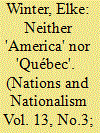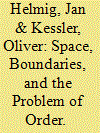| Srl | Item |
| 1 |
ID:
078563


|
|
|
|
|
| Publication |
2007.
|
| Summary/Abstract |
Although researchers have deconstructed the myth of stark social differences between the various North American sub-societies, an assimilating American melting pot and an ethnically oppressive monocultural Québec are still popular representations within Canadian majority discourses, such as the English-language mainstream media and parts of academia. In this paper, I argue that images of 'America' and 'Québec' play important roles for the multicultural reconstruction of Canadian nationhood. Examining selected op-ed articles from two Toronto-based mainstream newspapers during the 1990s, I develop and exemplify a theoretical understanding of how national identities are constituted and transformed within inter- and intra-national relations of power and alterity. I pay special attention to the particularisation of Canada through the confrontation with American nationhood, the ambiguities of recognising the distinctiveness of Québec inside Canada, and the consequences of projecting Québec's supposedly 'ethnic' nationalism outside the boundaries of Canadianness
|
|
|
|
|
|
|
|
|
|
|
|
|
|
|
|
| 2 |
ID:
078736


|
|
|
|
|
| Publication |
2007.
|
| Summary/Abstract |
The idea our global polity is chiefly divided by territorially organized nation-states captures contemporary constellations of power and authority only insufficiently. Through a decoupling of power and the state, political spaces no longer match geographical spaces. Instead of simply acknowledging a challenge to the state, there is the need to rethink the changing meaning of space for political processes. The paper identifies three aspects, a reconceptualization of the spatial assumptions that IR needs to address: the production of space, the constitutive role of boundaries, and the problem of order. With this contribution, we argue that one avenue in understanding the production of space and the following questions of order is by converging systems theory and critical geopolitics. While the latter has already developed a conceptual apparatus to analyze the production of space, the former comes with an encompassing theoretical background, which takes "world society" as the starting point of analysis. In this respect, nation states are understood as a form of internal differentiation of a wider system, namely world society
|
|
|
|
|
|
|
|
|
|
|
|
|
|
|
|